






You can support your loved ones' health by adding them to your membership for just an additional £12.80 per person, per month. So they too, can enjoy the same benefits as you, such as the 24/7 GP and Mental Health helplines. Plus access to the Benenden Health App and rewards straightaway.

" From my first call to Benenden Health requesting help with physiotherapy, to having my first face to face appointment which took less than a week, I am already making progress with my treatment. Everyone I have dealt with have been really helpful and offered first class help and advice. Thank you! "
Pamela, member since 2016
Access to the Physiotherapy service is available after six months of membership.
You'll receive a £15 M&S gift card* for every person you add to your membership. Offer ends 24th November 2023.
Please note that your call may be recorded for our mutual security and also for training and quality purposes. Lines are open 9am -5pm Monday to Fridays (except Bank Holidays).
Please see our website for the most up to date opening times.
* £15 M&S gift card for every new nominee added to an existing membership, quoting ADDAUTUMN at the point of joining. To qualify for the incentive, applications must be received by the 24th November 2023 and you and all new members must remain with Benenden Health at the point the gift cards are sent. Gift cards will be sent via post within 52 days of the new member joining. Gift card offer applies to people included in this promotional mailing. Offer subject to availability. No alternative to this promotion will be offered.
Benenden Health is a trading name of The Benenden Healthcare Society Limited, which is an incorporated Friendly Society, registered under the Friendly Societies Act 1992, registered number 480F. The Society's contractual business (the provision of tuberculosis benefit) is authorised by the Prudential Regulation Authority and regulated by the Financial Conduct Authority and the Prudential Regulation Authority, FRN 205351. Verify our registration at register.fca.org.uk. The remainder of the Society's business is undertaken on a discretionary basis. The Society is subject to Prudential Regulation Authority requirements for prudential management. No personal recommendation has been given. If in doubt as to the suitability of this product, you should seek independent advice. Registered Office: The Benenden Healthcare Society Limited, Holgate Park Drive, York, YO26 4GG.

With children’s mental health increasingly affected by online content, Be Healthy talked to this issue’s cover star, Natasha Kaplinsky, about her work to put in place better safeguards to protect young people – see page 20.
Benenden Health’s Cancer Support service offers members diagnosed with cancer reassuring help and advice – on page 18, we talk to one member who has used the service.


Plus, there’s a comprehensive guide to maintaining a healthy gut on page 24, information about fitness classes on the Benenden Health App on page 28, and practical advice on living with Parkinson’s on page 30.
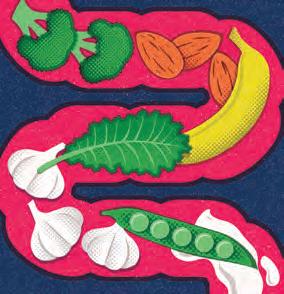
In the event of a sudden cardiac arrest, having quick access to an Automated External Defibrillator (AED) can mean the difference between life and death. Research by Resuscitation Council UK found that the average out-ofhospital cardiac arrest survival rate in England is 8.6%, in
contrast with that of other countries such as Holland (21%) and Norway (25%).
To give more people the opportunity to benefit from this vital piece of equipment, Benenden Charitable Trust and Benenden Health have donated 81 AEDs to communities across England. Society Matron and
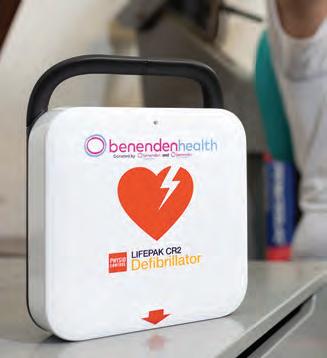

Head of the Benenden Charitable Trust Cheryl Lythgoe, who led the campaign, says: “Everyone at Benenden Charitable Trust and Benenden Health is delighted to help our members and their local communities with these donations.”
Following recommendations by Benenden Health members,
communities that have received an AED so far include Maidstone, Corringham, North Harrow and Setmurthy.
Another recipient is Ability Bow, a gym in London’s Tower Hamlets that specialises in helping people with disabilities and long-term health conditions to enjoy all the
benefits of exercise. Benenden Health member Richard Bow nominated the organisation in memory of his mother who had heart disease. “Ability Bow is a small charity that is doing great things,” says Richard. “The nearest A&E is an ambulance drive away so having an AED onsite is essential.”
Victoria Kent, CEO and one of the founders of Ability Bow, says: “Some of our clients have come through Phase 3 cardiac exercise programmes to continue their cardiac rehabilitation in our gym. Having an AED available gives both the community and our staff the confidence that we are offering the best possible care and service.”
Cheryl Lythgoe says: “The mobilisation from the communities we have helped has been inspiring in itself. We have seen individuals volunteer to install the AED on their home for easier access and healthcare professionals volunteer AED training for their neighbours. This is a perfect example of Benenden Charitable Trust’s core value of giving a ‘helping hand when life takes an unexpected turn’.”

Every year Benenden Health supports a variety of local organisations in York and the surrounding area with funding awards of up to £2,000. Recent recipients include:
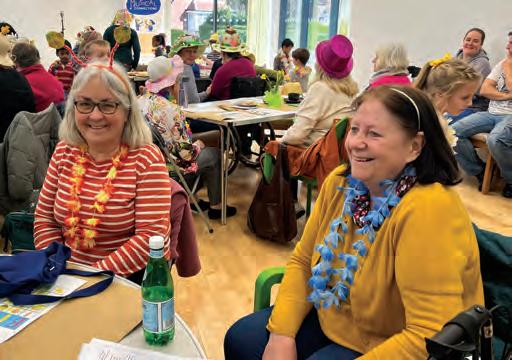
● This charity helps older, isolated and vulnerable people to live happier and healthier lives through music. One of its groups, Acomb Singers, run in partnership with York Medical Group, has created friendships between patients and the wider community. Project Manager Charlotte Yandell says: “With the support of Benenden Health, Acomb Singers can continue its work to ‘sing yourself happy’.” musical connections.org.uk
● This touring company creates theatre and digital experiences for, by and with young people aged 11-25. The Benenden Health funding award will enable it to establish a cinema club, offering people seeking sanctuary a chance to attend a monthly subtitled film screening, to boost social connections and ease isolation.

pilot-theatre.com
● The theatre applied to support the work of the Child and Adolescent Mental Health Service in York, and is using the funding award to run workshops with young people aged 11-18 struggling with their
mental health. Alice Merritt, Development Officer, says: “Through providing meaningful mental health support through creativity, we can make significant changes in the lives of young people in York.” yorktheatreroyal.co.uk

● This substance addiction recovery group is creating a Serenity Garden that will offer tranquillity as well as practical activities. The group’s project manager, Mark E Green, says: “The funding is a real gamechanger for us. We are building a community resource that is not exclusively for the recovery community. We are working with City of York Council so they can run

dementia-friendly gardening sessions and with a local primary school.” yorkinrecovery.org.uk/ serenity-garden
● The Trust provides community services for people with sight and hearing loss to help them remain as independent as possible for as long as possible. It also provides befriending services. Anne Parkinson, Bids Manager, says: “We are so grateful to Benenden Health for making all this possible. Our clients have told us how much our visits mean to them and how much they would appreciate more befriending hours.” wilberforcetrust.org.uk
Admit it, we’ve probably all done it: an ache or niggle appears out of nowhere and we immediately turn to our smartphones or laptop to find out more. However, while a quick
Google search can source useful information, it can often create more anxiety than may be necessary.
Research from Benenden Health backs this up, showing that British people consulted ‘Dr Google’ nearly 50 million times
last year, with 87% sourcing health information that does not come from health professionals.
The survey of 2,000 UK adults also revealed the top 10 concerns including mental health and women’s health
issues. There was a worrying shift towards self-diagnosis rather than speaking to a pharmacist or a GP, with 47% admitting to self-diagnosing after an online search, and 55% in the 35-54 age group doing so.
Rowan Connell, Medical Director, Benenden Hospital, says: “When there’s a long wait for doctors’ appointments, it’s easy to get impatient and the ability to self-diagnose via the internet can be too tempting for some.

“If you are looking for advice online, I would recommend visiting trusted sources such as the NHS website as a first port of call.
“However, at the first signs of illness, it’s always best to consult a pharmacist or a GP.”
To make an appointment for a telephone orvideo consultation with a UK-based GP, call our 24/7 GP Helpline, 24 hours a day, seven days a week on 08004148247. Or book a GP consultation via the Benenden Health App – appointments via the app are available from 8am until 10pm. For appointments outside these hours, please phone instead.
‘Theabilityto self-diagnose
theinternetcan betootempting forsome’
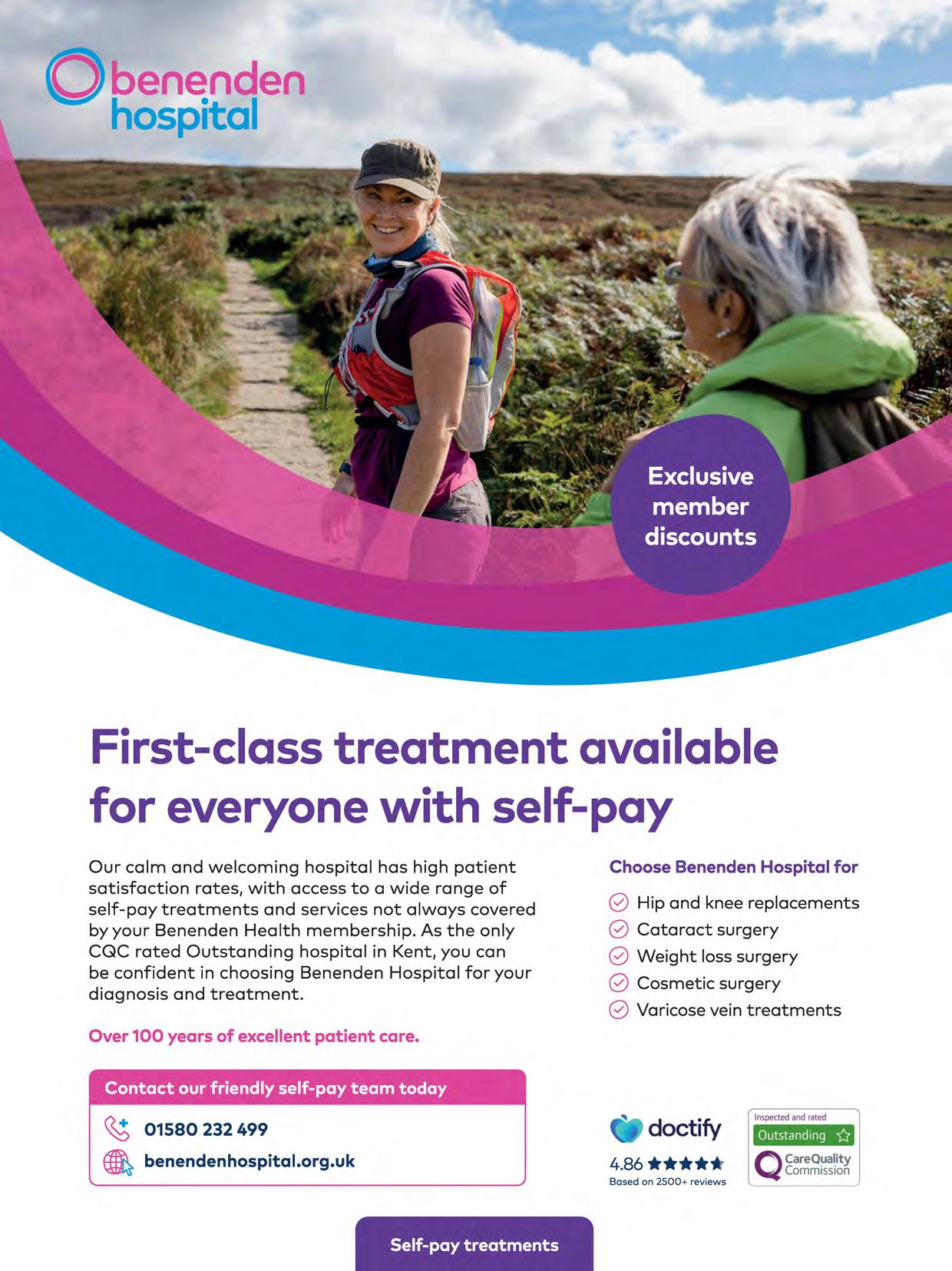
With health services increasingly under pressure, it is getting harder for many of us to get checked out regularly. Being able to understand and address any possible risk factors to our health is essential for long-term wellbeing.

A cost-effective and convenient solution, booking a Benenden Health Assessment offers the chance to take control of your health. Provided by Bluecrest Wellness, health assessments are offered at more than 400 venues in the UK, are usually available within three weeks of booking and can be booked up to 12 months in advance.
There are five comprehensive assessment levels to suit your budget, currently starting at £84* for members.
Depending on the level you choose, you can access a range of tests to check up on the following:
heart disease and stroke risk
biochemistry
mental wellbeing
kidney and liver function
lung function
heart rhythm (ECG)
thyroid function
bowel cancer risk

rheumatoid arthritis risk

Visit benenden.co.uk/ healthassessments to see what level of assessment is best for you.

To book a Benenden Health Assessment, call 08006522209 or visit benenden.co.uk/ membercheck. Discounts are available for Benenden Health members.
Results are reported as green, amber and red, indicating whether the result is within, marginally or further outside the standard range. If any critical issue comes up from the assessment, you will be contacted within 48 hours. Otherwise, within two weeks you will be provided with a printed report, complete with
what the results mean and any advice on what to do next. You can also download the report as a PDF and share it with your GP.
Please be aware, ‘critical’ values are specific to certain tests and are not applicable to all results. A red flag in your results report is not indicative of a critical result unless you have been contacted by a member of the Bluecrest results team.
*Price correct at time of going to press.
Thomas Hague, 49, Manchester
“I’mkeenonpreventative maintenance.AHealth Assessmentisagood waytounderstandany issuesandwhatIcando toimprovemyhealth.
“Ididtheassessment atalocalhotelandthe processwassimple.It washelpfulthatthey brokedowntheresults intovarioussections, helpedmeunderstand theresultsandgaveme suggestionsaboutwhatI couldimprove.
“It was reassuring that a lot of the results were green. However, something that would have stayed hidden if I’d not had the assessment was mycholesterol result, so I now know I need to work on mydiet.
“I’m a big fan of checking myhealth on a semi-regular basis and encourage others to do the same.”
ABenendenHealthAssessmentisacost-effectiveand convenientwaytobeproactivewithyourhealth
‘Healthassessmentsareofferedat morethan400venuesintheUKand areusuallyavailablewithinthreeweeks’Blood pressure is just one of the checks on your health
Health Assessments

Alongside our partner Bluecrest Wellness, we believe prevention is better than cure. Many medical conditions, like high cholesterol or pre-diabetes, may not always show symptoms but may impact your quality of life in the future. A health assessment uses non-invasive testing to help identify your risks of hidden illness. This is an excellent opportunity for you to take that first step and understand your current health status, so you can work towards improving and maintaining it.
Five health assessments to choose from Benenden Prevention Plus Standard Price £99
Usual Member Price £89
Special Member Price* £84
Visit: benenden.co.uk/healthy23 and use code: HEALTHY23
Our health assessments take place in meeting rooms within hotels or conference centres. We ensure you receive the same quality tests you'd expect from a hospital but in a convenient and relaxed setting for you.
As a Benenden Health member, not only can you save up to £90 with our special member prices*, you can also claim a free Vitamin D test if you book a Benenden Ultimate Health Assessment.
Or call us today: 0800 652 2209A and quote: HEALTHY23
A Lines are open 8am -6pm, Monday to Friday. Calls may be recorded for our mutual security and for training and quality purposes.
* Discount amount quoted is based on the standard price for non Benenden Health members if booked through Benenden Health. Special member price, and the free vitamin D test included in Benenden Ultimate Health Assessments, is only available to Benenden Health members and must quote HEALTHY23 over the phone when booking or use the offer code HEALTHY23 when booking online. Benenden Health membership must be verified. Valid on bookings made up to and including 01/06/2024. Benenden Health reserves the right to alter, amend or withdraw this offer at any time.
Benenden Health is a trading name of The Benenden Healthcare Society Limited. Benenden Health Assessments are offered by Benenden Wellbeing Limited, which is a wholly owned subsidiary of The Ben en den Healthcare Society Limited. Ben en den Wellbeing Limited is registered in England and Wales (Company No 08271017). Registered Office: Benenden Wellbeing Limited, Holgate Park Drive, York, YO26 4GG. Benenden Health Assessments are provided by Bluecrest Wellness. Registered in England and Wales (Company No 08119445). Registered office: Bluecrest Centre of Excellence, First Floor, Ridgeworth House, 5/9 Liverpool Gardens, Worthing BN111RY. The provision of Health Assessments is not regulated by the Financial Conduct Authority.
An antidote to our busy lives, forest bathing involves spending mindful time under the tree canopy, where you slow down, notice your surroundings and take time to explore the woodland.

“In Japan, forest bathing – or shinrin-yoku – is part of a country-wide public health intervention, both treating and preventing mental and physical ill-health,” explains Gary Evans, co-founder of The Forest Bathing Institute (TFBI) in the UK.
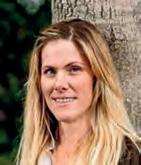
Benefits include lower blood pressure, better heart health and a lessening of depression, according to Japanese research.

The UK’s first scientific study – conducted in 2019 by TFBI and the University of Derby
– focused on TFBI’s own Forest Bathing+ sessions, which are underpinned by mindfulness and led by a trained guide.
“The research found that after two hours of Forest Bathing+, 88% of participants reported an average 29% reduction in anxiety, while 57% showed an increase in heart rate variability, indicating good cardiovascular health,” says Gary.
For novice forest bathers, Gary advises silencing your phone, soaking up the forest atmosphere and being inquisitive. “Take time to notice the shades of green. Study the trees’ bark texture, touch the moss. Listen to the sound of birdsong and gaze skyward, watching the trees sway in the breeze.”
l See tfb.institute for more
Faith Douglas shares her experience
Ten years ago, I was in an abusive relationship, and to cope, I learned mindfulness. Then I read about forest bathing and started practising it.
In 2015 I set up Forest Bathing UK, offering guided sessions. I practise daily myself, focusing on what I can see, hear, smell, touch. Our modern lives are distracted, disconnected. With forest bathing, you connect with the environment, helping you connect better with others and with yourself. Breathing in trees’ essential oils balances our cortisol levels, lessening stress. I’ve even incorporated it into my work with charities supporting military veterans.
l The Nature Remedy by Faith Douglas is published by HQ, RRP £14.99
Long hours hunched over a computer keyboard or laptop can cause aches and pains if you don’t stretch properly. Keep joints supple and limbs mobile with these four easy moves
 BY LUCY FRY
BY LUCY FRY
Screens tend to encourage jutting the chin forward, placing the entire weight of your head on the cervical spine for long periods. To avoid chronic issues, stretch the back of your neck every 20 minutes by pulling your chin towards your collarbone for 15 seconds.
Take a break
l Short frequent breaks are better than long infrequent ones. Try wandering for five minutes every hour to keep the blood circulating to muscles and joints. Sitting still for hours can deactivate our all-important buttock muscles that support our backs.
Stay hydrated
l Not only does decent hydration keep you alert, you’ll also take more loo breaks, which means standing and moving more. Plus, the synovial fluid that keeps joints supple is mostly made of water.

Avoid chronic hip stiffness by squatting near your chair for one to two minutes every hour (perhaps warn colleagues first!). If you struggle to get down into a squat, place a thick book under each heel.
Place hands shoulder-width apart against the wall at approximately your chest height. With arms slightly bent, walk your feet backwards and push into your bum until your body is at a right angle to your legs. Now look down and push your bottom back so you stretch your thoracic spine. Start lightly, hold for 10 seconds, then repeat a little deeper, three times.
Keep your backbone supple by standing once every few hours and twisting the upper body from side to side. With your arms out to the side and palms down, twist to the right, allowing your right arm to come behind your body and your left hand to come across across your right shoulder, then reverse the movement. Continue for two minutes, allowing your torso and legs to twist too.
Benenden Hospital’s Consultant Neurologist
Dr Gerry Saldanha on dealing with severe headaches
A migraine usually manifests as an intense, throbbing headache on one side of the head. In most cases, it’s accompanied by nausea, vomiting and sensitivity to light, sound and smells. Around a third of sufferers also experience migraine aura, visual disturbances such as flashing lights, zigzag lines or blind spots, before the headache starts. The aura usually lasts up to 30 minutes.
Migraine is more common in females, with around one in five affected, as opposed to one in 15 males. It tends to run in families and usually starts in the teenage years.
Common triggers include bright lights, lack of sleep, dehydration, stress, neck tension caused by poor posture, and even a change in the weather. Changes in hormone levels during the menstrual cycle, pregnancy or the menopause can also trigger migraines. In some cases, they become less frequent and severe as you get older.
The most important thing is to recognise your own personal triggers and avoid them. Keeping to regular sleep patterns helps – too much sleep can be as bad as too little. Painkillers such as
ibuprofen can be effective if taken as soon as a migraine starts. If you take them once the headache is established, they’re unlikely to work.
Triptans are migraine-specific medications that also need to be taken at the onset of pain. You may also be prescribed a stronger painkiller, such as naproxen. If you have frequent migraines, your GP may suggest you try preventative medications, such as beta blockers, a type of antidepressant or anti-epileptic drugs. With these medicines, it’s important to increase the dose gradually until you find the level that’s effective for you.
Benenden Hospital offers self-pay Botox® treatment to sufferers of chronic migraine. To qualify, you must have headaches for at least 15 days a month, and eight of these with more severe migraine symptoms. You must also have tried at least three oral preventative drugs without effect.
Botox® treatment involves a series of injections into the muscles of the head and neck and works by blocking migraine pain signals in the brain. About half of patients experience a significant reduction in headache frequency and severity, but the effect wears off after three months, so the treatment needs to be repeated.

SELF-PAY SERVICES AT BENENDEN HOSPITAL
For information on self-pay treatments at Benenden Hospital, call 01580 232499
When Samantha Linstrem, 56, was diagnosed with cancer in May 2022, it quickly had an impact on the family’s finances. The school wellbeing officer from Dover couldn’t work due to her treatment and her husband had to cut back his hours to support her. “As a family we’d always been doing OK but suddenly we experienced a dramatic drop in income.”

Samantha, a member of Benenden Health for 20 years, was already receiving advice through Benenden Health’s Cancer Support service. Her specialist nurse, Julie, suggested she apply for a grant from Benenden Charitable Trust (BCT).
“Having cancer incurred unexpected expenses,” says Samantha. “Things like petrol for hospital visits, food that I didn’t normally buy and wellbeing products to make my treatment more comfortable. The hot summer meant I needed a lot of hats, scarves and creams. I needed to buy safe products for my thinning hair and my skin.”
Samantha found the application process both straightforward and reassuring. “BCT were so good in helping me navigate the forms. Michelle would ring me to clarify and suggest expenses that I might want to include in the application. She was so empathetic – I didn’t feel embarrassed to talk to her about finances.”
Benenden Charitable Trust provides financial assistance to current and former members of Benenden Health.
We can agree grants of up to £3,000 for a variety of healthrelated needs, including specialist equipment and home adaptations, as well as financial assistance where managing everyday living costs is a struggle. We can also help in unexpected situations which aren’t related to a health condition, such as bereavement, divorce or redundancy.
l Apply online or download a form at benenden.co.uk/charitable-trust
l Call us on 0800 414 8450 (Mon-Fri, 8am-4pm) to discuss your circumstances and to request an application form
l Email us at charitabletrust@ benenden.org.uk
Samantha was given the all-clear of breast cancer in December, but subsequently was diagnosed with throat cancer. After three major operations in March to remove the cancer, she is now having a course of chemotherapy and radiotherapy to prevent its return.
She describes it as ‘alien’ to her to have to ask for support – but was delighted to receive the funding.
Poor eye health can affect our quality of life, especially as we age. Benenden Hospital’s team of ophthalmologists are here to help with a range of self-pay treatments and services
BY PENNIE TAYLORSafeguard your eye health
HAVE REGULAR EYE TESTS
Visit an optician at least once every two years
EAT WELL
A balanced diet including oily fish, green vegetables and fruit promotes eye health
DON’T SMOKE
Smoking is linked to age-related macular degeneration, glaucoma and cataracts
WEAR SUNGLASSES
Protect your eyes as ultraviolet rays can cause eye problems, including cataracts

Simple pleasures such as reading are affected by poor eyesight

Sight loss can have life-altering consequences: the ability to drive and read, to practise crafts and hobbies, and even to maintain personal independence depends on a person’s capacity to see. Growing older brings a high chance of vision degeneration but, thankfully, there is plenty that can be done to correct it.
Benenden Hospital’s dedicated Eye Unit in Kent is one of the largest centres in the country for eye surgery. “Our patients are typically over 60 and still have a lot of life to look forward to,” says Mr Wallace Poon, Consultant Ophthalmologist and Clinical Lead of Benenden Hospital’s Eye Unit. “Poor vision impairs people’s ability to do what they want and surgery can have an amazing impact.”
At Benenden Hospital, a team of 12 consultant
ophthalmologists delivers a range of specialist eye services to correct several conditions.



The most prevalent problem is cataracts, where the lens inside the eye becomes cloudy, gradually diminishing vision. Affecting an estimated one in three older people, cataracts can be surgically removed and replaced with artificial lenses to restore clear sight.
“We’re performing around 4,000 cataract operations a year here, which makes ours a very high-performing service,” says Mr Poon. “We are streamlining the process to reduce the number of times patients attend clinic before day-case surgery takes place by offering virtual optometrist consultations,” he adds. “However, it is important that surgeons meet patients face to face pre-operatively to plan the right approach.”
These lenses include multifocal lenses for distance, middle and near vision. There are also toric lenses, which can correct astigmatism.
“Our patients have all the options explained to them, taking into account the details of their eye pathology and lifestyle,” says Mr Poon. “If you consider the cost of glasses, special lens cataract
Patients are typically referred to the Eye Unit by their optician or GP, and undergo a series of investigations to establish overall eye health, which may detect underlying problems such as glaucoma. An optical coherence tomography scan of the back of the eye can also reveal age-related macular degeneration, which may require onward referral. There is a range of options for lens replacement including standard lens replacement and special lens replacement (see above). The standard lens is monofocal, with the choice of either distance vision or near vision.
For information on self-pay treatments at Benenden Hospital, call 01580 232499 and ask about member discounts and payment plans.


Another area of surgical expertise at Benenden Hospital is blepharoplasty – the correction of droopy, saggy or baggy eyelids.
“As well as offering cosmetic improvement by removing excess skin, surgery can have a functional benefit by addressing hooding that affects the visual field,” says Consultant Ophthalmologist and Oculoplastic Specialist Mr
Joe Devereux. “It is very precise and delicate work.”
In addition, Benenden Hospital operates to correct eyelids that grow inwards or outwards, and to remove growths. Non-surgical treatments include lacrymal washout to clear blocked tear ducts causing watery

surgery can be a good investment.”
The surgeon uses a surgical microscope to site each lens in a procedure that takes around 15 minutes. Following post-op assessment, patients are discharged. “Ninety-five per cent of them notice sight improvement but not necessarily straightaway,” says Mr Poon.
Delia Worth had both her cataracts removed within two months of each other at Benenden Hospital’s dedicated Eye Unit. She also had toric lenses inserted to correct astigmatisms which differed in both eyes.
“Since having both my cataracts removed, it’s been lifechanging. I’ve been able to dispense totally with my lenses and glasses, which I’ve worn since the age of 11. I can now drive at night, I can read and I can swim without worrying about getting water in my eyes. The world seems a brighter, clearer place.”
eyes, and treatment to relieve dry-eye disease, when the surface of the eye feels gritty, which causes discomfort.
“Our eyes can cause us problems, particularly as we age,” says Mr Devereux. “It’s important to know that help is available.”
Breakfast, lunch and dinner ideas that are high in fibre and high in flavour

BREAKFAST
Apple bircher Contains: gluten, milk and nuts
Serves: 2
Prep: 5 mins
Calories: 407
Fat: 16g (34%*)
Protein: 12g (11%*)
Carbs: 59g (55%*)
WHAT GOES IN
1 apple, coarsely grated
50g jumbo porridge oats
25g mixed seeds
25g mixed nuts
1/4 tsp ground cinnamon
100g full-fat natural bio
yogurt
1 medium banana, sliced
Want more recipe ideas?
5 minutes to make
407 calories
100ml water
25g sultanas
2 tbsp muesli
1. Put the grated apple in a bowl and add the oats, seeds, half the nuts and the cinnamon.
Check out the Wellbeing Hub on the Benenden Health App for more healthy recipes for you and your family. Download it from the Apple App Store or Google Play Store and log in using your My Benenden account details. See benenden. co.uk/mobile/app for more details.
2. Toss together well.
3. Stir in the yoghurt and 100ml cold water, cover and chill for several hours or overnight.
4. Spoon the muesli into two bowls and top with the banana, sultanas and remaining nuts.

Contains: gluten, sulphur dioxide and sulphites
Serves: 4
Prep: 25 mins
Calories: 421
Fat: 19g (40%*)
Protein: 11g (10%*)
Carbs: 53g (50%*)
400g canned black beans
100g cheese (or vegan cheese)
150g canned sweetcorn
2 green jalapeños
1 small red onion
1 small iceberg lettuce
1 lime
8 corn taco shells
Sprinkle of salt and pepper
1 large avocado, pitted and diced
2 tbsp soya yogurt
4 vine tomatoes, seeded and chopped
1. For the cream, combine

Contains: nuts
Serves: 2
Prep: 1 hour
Calories: 512
Fat: 14g (23%*)
Protein: 34g (25%*)
Carbs: 68g (51%*)
WHAT GOES IN
1 tbsp vegetable oil
1 onion
2 garlic cloves
1 tsp ginger, peeled and finely chopped
2 tbsp mild curry powder
½ tsp turmeric
2 cardamom pods
½ cinnamon stick
2 skinless chicken breasts
250g basmati or brown rice
300ml chicken stock
100ml coconut milk
38g frozen peas
75g green beans, trimmed and halved
225g cauliflower
1 tbsp flaked almonds
Handful of coriander
1. Heat the oil in a large pot (that has a lid) over medium heat, then fry the onion, garlic and ginger until brown and fragrant, about 10 mins.
2. Stir in the curry powder, turmeric, cardamom and cinnamon.
most of the avocado with the yoghurt and a couple of tablespoons of hot water in a food processor. Blend until creamy.
2. Scrape into a bowl and stir through the remaining avocado and half the chopped tomato. Season to taste.
3. For the tacos, stir together the beans, sweetcorn, cheese, remaining tomatoes, jalapeños, onion, lettuce and seasoning in a large mixing bowl.
4. Squeeze the juice from a couple of lime wedges into the bowl and toss well.
5. Spoon the filling into the taco shells and serve with the avocado dip and remaining lime wedges on the side.
3. Add the chicken and cook for a couple of minutes, stirring to colour on all sides.
4. Stir in the stock, coconut milk, a generous pinch of seasoning and the veg.
5. Bring to a boil, then reduce to a simmer, cover and cook for about 25-30 mins until the water has been absorbed, the chicken is cooked through and the veg is tender.
6. Cook rice as per packet instructions and serve on the side.
7. Remove the cardamom pods and cinnamon sticks, and scatter over the almonds and coriander.
* Only Benenden Health members are eligible to apply. To find out more, visit benenden.co.uk/smile23

** Lines are open between 9:00am and 5:00pm, Monday to Friday. Calls may be recorded for our mutual security and for training and quality purposes.
Benenden Health Cash Plan is offered by Benenden Wellbeing Limited, an insurance intermediary, which is authorised and regulated by the Financial Conduct Authority (Financial Services Register number 593286). Registered in England and Wales (company no. 8271017). Benenden Wellbeing Limited is o wholly owned subsidiary of The Benenden Healthcare Society Limited. The Registered Office of both: Holgate Park Drive, York, YO26 4GG. Benenden Health is a trading name of The Benenden Healthcare Society Limited.
Benenden Health Cash Plan cover is issued and administered by BHSF Limited. BHSF Limited is authorised by the Prudential Regulation Authority and regulated by the Financial Conduct Authority and Prudential Regulation Authority (202038). Registered in England and Wales (company number 00035500). Registered office: 13th Floor, 54 Hagley Rood, Birmingham, B16 8PE.
Most of us hate talking about dying. “We don’t think about it or prepare for it,” says Sue Gill, a volunteer with the charity Cruse Bereavement Support. “But death and bereavement are things we will all face.”
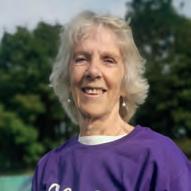

1 TAKEYOURTIME
When bereaved, we often feel disbelief. “Even thoughyou know inyour head that somebodyhas died, it takes a long time for it to hit home inyour heart,” says Sue.
2 GROWAROUND YOURGRIEF
Grief doesn’t go away–you just learn to live with it. “The concept of ‘growing around grief’ originated from a newlybereaved mother who felt her life was just a big black circle,” explains Sue. “Ayear later, she said the black circle was still the same size, but that she’d built her life around it to accommodate the grief.”
3 ACCEPTHELP
If someone asks how you are orwhat theycan do, tell them. “Say, ‘I’m having a rubbish day. Doyou fancy coming for a coffee?’” advises Sue.
4 OPENUP Talk about the dead person. “Familymembers often grieve separately, afraid of upsetting each other. But suppressed grief simplyresurfaces later.”
When first bereaved, the pain can be so immense you don’t know how to deal with it – orwith anything else. “So put off major decisions, such as selling a property,” advises Sue.
6 WRITEDOWNYOUR FEELINGS
This helpsyou see progress. “Looking back,you’ll see the positive stepsyou’ve made,” explains Sue.
7BEAWAREOF LANDMARKDAYS
Prepare ahead for Christmas, birthdays and so on. “When someone dies, you don’t stop loving them, so pretending it’s just
another day doesn’t work,” Sue explains. “Acknowledge the sadness but also celebrate your loved one’s life – for example, byvisiting their favourite place.”
8 SHAREYOUR CONDOLENCES
Never avoid someone who’s bereaved because you don’t know what to say. “Simplygive them a hug and say‘I’m sorry Fred’s died’ – acknowledging the death and using the person’s name.” Cruse advises against using euphemisms. “We always saysomebody’s died – never ‘passed away’.”
9LISTEN
“The greatest giftyou can give anyone who’s bereaved is an hour of yourtime to listen,” says Sue. “But do avoid chipping in withyour own bereavement story.”
10 FINDSUPPORT
Cruse offers a free confidential helpline, one-toone support and online help.

Our Cancer Support service provides ongoing telephone advice for members who have cancer

Acancer diagnosis is devastating.
Suddenly daily routines are all about navigating appointments, treatment and results – it’s a life-changing moment for patients and their families.
Much-needed reassurance is available through our Cancer Support service.

After six months of membership, if you have cancer, you can request our Cancer Support service, which provides access to a registered nurse who will provide you with emotional and practical support and advice.
Your dedicated nurse will call or email you regularly to discuss
concerns or questions you have in relation to your illness. This will continue for as long as your nurse feels support is required.
Tailored to your specific needs, the type of support and information given may include:
Helping you to understand your diagnosis and its potential consequences.
Helping you to prepare questions ahead of consultations or supporting you to understand what’s been discussed.
Helping you to access services available from the NHS and other organisations.
Practical advice on dealing with the implications of cancer.
Preparing you to return to work and supporting you after your return.
Your nurse in their clinical discretion may:
Identify, arrange and pay* for services or therapies delivered by third parties to help you with issues related to your condition, including short-term home care and complementary therapies.
Arrange and pay* for specialised clothing, head coverings and prostheses.

Signpost you to other membership services provided by Benenden Health such as the 24/7 Mental Health Helpline.
Signpost you to the Benenden Charitable Trust, which can provide grants towards other items that may help you.
Signpost you to local and national charities, organisations or support groups.
Michelle Thornton, 60, a civil servant who lives in Lancashire, has been a Benenden Health member for more than 20 years

In June 2022, Michelle was diagnosed with breast cancer and started a gruelling schedule of treatment, including three operations followed by radiotherapy in four months.
“I read about the Cancer Support service in Be Healthy magazine,” recalls Michelle. “After my first operation in July, I was looking for advice and reassurance from a clinical perspective, so I contacted Benenden Health for help and support.
Michelle was assigned a dedicated nurse, Laura Foran, and she rang straight back. “It was good to have someone to talk to who wasn’t part of my NHS team,” says Michelle. “She became that person to talk to confidentially, giving me support while I was waiting for results and finding answers for me. She always rang me at the time we agreed and was there for me at key stages,
for example after my operations and following results.
Michelle found it useful to ask Laura for a second opinion. “It was great to have support throughout my journey and she gave me advice on things such as looking after my wounds from a medical point of view when I didn’t want to bother the NHS breast care nurses.
Michelle decided to return to work just before her radiotherapy ended: “Laura helped me to prepare for my return to work and supported me to do so. She also researched some local cancer support groups, although in the end I decided they weren’t for me as I just wanted to get on with my life.”
Michelle values the relationship she developed with Laura. “She said I could ring her at any time. It was an excellent service – I wouldn’t hesitate to recommend it to other members.”

We won’t provide Cancer Support relating to the same medical condition on the same body area within two years of us first authorising support.
The Cancer Support service is not available for basal cell carcinomas.
We won’t pay for any services or items purchased directly.
Cancer Support is designed to supplement, not replace, primary consultant-led care provided in the NHS or privately. Your primary care remains the responsibility of the NHS or private consultant.
* This is subject to a per case budget agreed with our Service Partner
A life led increasingly online is making it harder for parents to protect their children’s mental health.
ne of TV’s most recognisable faces, news presenter and winner of the inaugural series of Strictly Come Dancing, Natasha Kaplinsky has a personal as well as professional interest in keeping young people safe online.

“As my children, Arlo and Angelica, reached their teens, I became increasingly aware of the challenges of growing up these days,” she says. Natasha is president of the British Board of Film Classification (BBFC),
a role she sees as a big responsibility and a huge honour.
“I’ve always been passionate about issues affecting children’s rights and welfare,” she says. “As a news journalist you’re constantly making decisions about what’s appropriate to show at different times of the day, so there’s a direct link with the work I’m doing at the BBFC.”
Natasha has long been involved in helping children and young people deal with mental health issues. As president of children’s charity Barnardo’s, she helps raise awareness of issues, including mental wellbeing, that affect vulnerable
young people and their families. “Being a child at the moment is very tricky,” she says. “I’m fully aware of the influences that our children are under and that they’re bombarded by this content constantly. You see how it influences their behaviour.”
Natasha explains how lockdown really put these issues into sharp focus as a generation of kids were suddenly given access to online material without much guidance on how to navigate it safely.
“It was overwhelming. I know all too well the harmful impact that film and video content, including online and social media, can have on young people. There are so many platforms – it can often be a worrying situation for a parent.”

As a family they’ve always relied on the BBFC classification system when choosing what to watch. “Everyone knows the BBFC’s age ratings from the cinema and DVDs, but these days we’re working more with video on demand and streaming services such as Netflix and Prime Video to help their subscribers choose what’s right for them and their families. Looking out for trusted BBFC age ratings and content advice can give people the confidence they need to know whether something is right for their family.”
The prevalence of online, often violent, pornography and its ease of access is a
‘I know all too well the harmful impact that film and video content can have on young people’
big concern for Natasha and the BBFC. “This is sadly the reality that many children are facing, and it’s important that parents understand the need to talk to their children about what they might see online and how to stay safe, however awkward it might be to get on to the topic of sex and porn,” she says.
“In the offline world explicit adult material is strictly regulated by the BBFC,” says Natasha. “However, equivalent protections don’t exist online, so content that would never be classified for distribution offline is freely available on the internet.
“That’s a big problem. To me it’s logical that where society says content is unacceptable offline, that same content should be unacceptable online too. I know there’s a lot of support for it, both in parliament and from child protection groups such as Barnardo’s.”
Natasha also advocates the need for consistent education on healthy relationships and sex, enabling young people to better distinguish between
material depicting positive, consensual scenarios and material depicting potentially dangerous ones. “Technical measures can help as well, and age verification checks to prevent children accessing adult sites would have an enormous impact.
“Bringing in the same level of protections that exist offline is common sense,” says Natasha. “Children can’t just walk in and buy a pornographic DVD. They shouldn’t be able to do the equivalent online either.”
If your child is experiencing low mood and/or anxiety or depression, call our 24/7 Mental Health Helpline on 0800 414 8247 to book an appointment for support and advice.
TIKTOK
Fast and engaging, TikTok hosts videos between 15 seconds and three minutes long, with some influencers’ videos viewed millions of times.
Lets people connect through comments, captions, reels, stories and hashtags on photos and videos. Inform your child that many users deploy filters to enhance reality.
Photos, texts and videos only last on screen for a matter of seconds before disappearing, although users can also add images or videos to their story for
followers to see for 24 hours. Any abuse and bullying leaves no trace unless the viewer takes a screenshot of it.
Used by all ages, but these days young people use Facebook mainly to organise events.
YOUTUBE
A video-sharing website where you can watch videos without registering an account.
Allows users to send and receive messages, images and videos to and from their phone contacts as individuals and groups. Only the sender and recipient can
see the message. The age requirement is 16, but many parents add younger children to family groups.
BEREAL
Its appeal to many parents is the lack of a photo filter function. Its main feature is a daily notification encouraging users to share a photo of themselves and their surroundings in a randomly selected two-minute window every day.

Lets people communicate in short messages and follow brands, influencers and celebrities. This platform is known for people getting offensive in arguments with strangers.
Social media is here to stay, and it has revolutionised the way we stay connected and learn about the world. However, it presents a huge challenge for parents as they often realise too late that they need to get more actively involved to help keep their children safe online and away from harmful content.
The dangers are further highlighted by tragic stories such as Molly Russell, who killed herself after being exposed to self-harming and suicide content online. Meanwhile, a recent study by the children’s commissioner for England found that a quarter of children had been exposed to pornography in their final year at primary school.
‘Where society says content is unacceptable offline, that same content should be unacceptable online too’
STAY INFORMED
Learn about the different social media platforms, including the positive and negative aspects.
TALK ABOUT IT
Start the conversations early and continue them well into the teenage years. Most platforms are for age 13+, but children know how to get past the age checks
and are often helped by parents concerned they may feel left out if their peers are involved.
Try to keep all phones and other devices out of bedrooms, parents included.
Developing a love of reading in your child from when they
are a baby will help reduce their reliance on devices.
Understand what your children are viewing and who with, teenagers included. You may have strict controls, but different standards may apply in other households, especially those with teenagers of different ages.
Natasha believes it’s important to educate children about healthy relationships

Start from preschool
onwards, agree limits on screen time for children of all ages and use timers. Hopefully this will stop arguments!
Set up routines where you can be together and online to reduce the chance of possibly harmful scrolling.
Nine metres long, home to trillions of micro-organisms, and with its very own nervous system, your gut is a truly amazing organ. And science is only just beginning to understand the key role played by a healthy gut in our overall wellbeing.
From microbiomes and good bacteria to keeping an eye on your poos and farts (yes, really), here’s a quick guide to getting to know your gut.
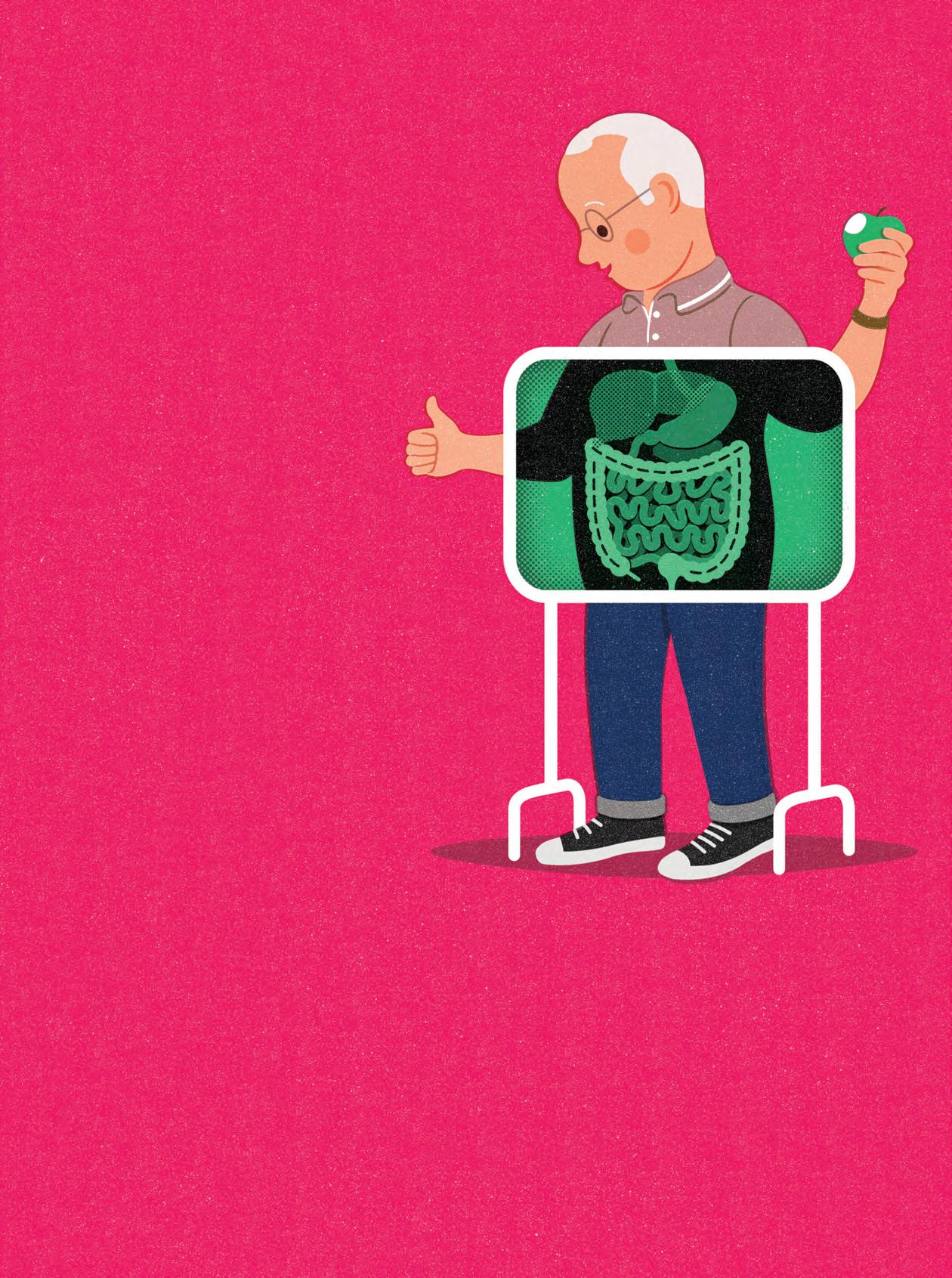
At the centre of the latest research is the microbiome, the huge collection of bacteria, viruses and fungi that lives in your digestive system.
The largest population is in your colon, the lower part of your gut. Among their many jobs, these microbes help you digest foods, absorb vitamins and medicines, and
send messages to and from your brain.
A healthy microbiome, with plenty of friendly bacteria keeping the potentially harmful ones at bay, also supports your immune system and reduces the chronic, low-level inflammation that can lead to conditions such as heart disease, obesity and type 2 diabetes.
Other benefits of a healthy microbiome include better-quality sleep and improved mental health. It’s long been known that stress can have an impact on the digestive system and now research suggests that it also works in other ways, with gut bacteria helping to produce substances that play a part in stabilising mood.
Farting is a taboo subject, but we all do it – the average person passes wind about 15 times a day. Digestion produces several different gases, including sulphur, which is responsible for the smelly ones. Obviously you need to choose your time and place, but it’s better out than in. Wind that gets trapped in your gut can cause pain and bloating, and it seems some people are more sensitive to the presence of gas than others.
To reduce excessive gas production, try keeping a food journal to identify foods
that make you windy. Common culprits are cruciferous vegetables, such as broccoli and cauliflower, onions, pulses, dried fruits and the sweetener, sorbitol. You may also be in the habit of swallowing air, so eat slowly with your mouth closed, and avoid fizzy drinks and chewing gum.
Finally, constant stinky farts can be a symptom of an underlying gut problem so, if none of this works, talk to your GP, especially if you have other gut-related symptoms.

● Insoluble fibre does not dissolve in water and is left intact and undigested. Insoluble fibre can help to speed up the passage of food through the stomach and intestine. It also adds bulk to the stool. It is found in nuts and seeds, grains, many vegetables and legumes such as beans, lentils and peas.

The make-up of your microbiome is unique to you, and is influenced by many factors, such as heredity, lifestyle, environment, diet and medications.
One way to boost a healthy biome is to develop good lifestyle habits. Research has shown that regular exercise increases the diversity of microbes. It also helps to reduce stress and improves sleep quality, both of which
can have a positive effect on your gut flora.
Experts say a diverse range of bacteria is key to good health. However, unhealthy diets, a sanitised environment and use of antibiotics, which kill good bacteria as well as bad, mean many of us have a microbiome that’s out of balance.

For tips on good bacteriaboosting foods, see Abir’s tips, right.
● Soluble fibre dissolves in water, retains water, and forms a gel-like substance in the colon. It slows down digestion and nutrient absorption from the stomach and intestine. It is found in oats, banana, sweet potato, green beans, berries and other vegetables.
Use bone broth/stock in soups and sauces and cook rice in half broth/half water. Bone broth contains
many nutritional benefits, specifically from the gelatin component that supports the mucosal layer of the gut. Cooking meat on the bone (eg chicken thigh stew or curry) is a good way to benefit from gelatin’s nutritional properties.
Try a little fermented food (eg sauerkraut or kimchi –1-2 tsp) with meals to aid digestion. Kefir (fermented milk drink) or a small pot of plain live yoghurt also provide some live probiotic bacteria to support the gut ecosystem.
Eat a whole food diet featuring plenty of colourful vegetables.
Buy natural and organic where possible to reduce exposure to chemicals.
Looking in the pan before you flush could save your life. Blood in your poo always merits a trip to your GP. There are several possible causes, but there’s also a chance it could be a sign of bowel cancer, which can often be cured when it’s caught early.

In a recent Benenden Health survey, over a third of adults described their poo as ‘unusual’, although many were reluctant to consult a GP about it. It’s normal to go anything from three times a day to three times a week, and an ideal poo is brown, sausage-shaped, and easy to pass.
To achieve this, you need to include plenty of fibre in your diet, drink enough fluids, and get regular exercise. There are two types of fibre. Insoluble fibre is tough, stringy and hard to digest so bulks out your poo and keeps things moving. Soluble fibre dissolves in water, forming a gel-like substance that helps you produce poo that’s solid but not too hard.
Many whole grains, pulses, fruit and vegetables contain both types of fibre. If you want to increase your intake, do it gradually as a sudden change can cause digestive problems.
Ifyouhaveanyconcerns,chattoyourGPorcall our24/7GPHelplineon08004148247.Formore onguthealth,seebenenden.co.uk/guthealthor checkoutthequizatbenenden.co.uk/gutquiz
As always, checkwith yourpharmacist orGP if you notice anynewor unusual symptoms.
ACID REFLUX
Aburningsensationinyour chestcausedbystomach acidtravellingupwards.
IRRITABLE BOWEL SYNDROME (IBS)
Symptomsofthiscommon conditionincludecramps, bloating,diarrhoeaand constipation.
FOR IDEAS OF HIGH-FIBRE MEALS, SEE PAGE14
Some foods can change the colour ofyour poo. Beetroot, for example, can turn it an alarming shade of red! But if your poo turns a strange colourfor no obvious reason, check withyour GP. Here’s what it could mean:
BLACK Bleeding inyour upper gut; also caused bysome medicines, such as Pepto Bismol, or iron supplements
YELLOWYou’re not absorbing fats properly; poo mayalso be smellyand greasy
This is a useful guide to assess the state ofyour poo
GREEN A gut infection; liver or gall bladder problems
RED Bleeding in your lower gut
WHITE,OR CLAY-COLOURED
Alackofbile,releasedby thelivertobreakdownfats
INFLAMMATORYBOWEL DISEASE (IBD)
Can take the form of ulcerative colitis or Crohn’s disease. Symptoms include pain, bloating, bloodydiarrhoea, tiredness and weight loss.
COELIAC DISEASE
Thisiscausedbyareaction togluten,foundinwheat, barleyandrye.Symptoms includepain,bloating, constipationanddiarrhoea.
BOWELCANCER
Symptomsincludea changeinbowelhabits thatlastslongerthan threeweeks,bloodinyour pooandweightloss.
WHAT’SNORMAL?
*Types 3 and 4 are considered normal
* Terms and conditions apply, visit benenden.co.uk/terms for full details.

For information on Benenden Health's use and processing of your data, as well as information about your rights, please refer to our Privacy Policy which can be found at www.benenden.co.uk/privacy -policy or can be requested by calling us.
Benenden Health is the trading name of The Benenden Healthcare Society Limited, which is an incorporated Friendly Society, registered under the Friendly Societies Act 1992, registered number 480F. The Society's contractual business (the provision of tuberculosis benefit) is authorised by the Prudential Regulation Authority and regulated by the Financial Conduct Authority and the Prudential Regulation Authority, (Financial Services Register number 205351). Verify our registration at register.fca.org.uk. The remainder of the Society's business is undertaken on a discretionary basis. Registered Office: Holgate Park Drive, York, YO26 4GG.
Staying active is an important part of a healthy lifestyle. But many factors, including time and budget constraints – and, let’s face it, willpower – can often make it difficult to stick to a regular exercise routine.
As a Benenden Health member, you can access a range of free fitness classes on the Benenden Health App, designed for all ages and activity levels. Simply log in to take a live class or access it on demand at a time to suit you.
One member who participates in online fitness classes on the Benenden Health App is Judi Allen from Royal Hillsborough. “I’ve been practising yoga for many years
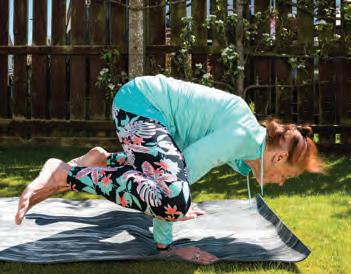
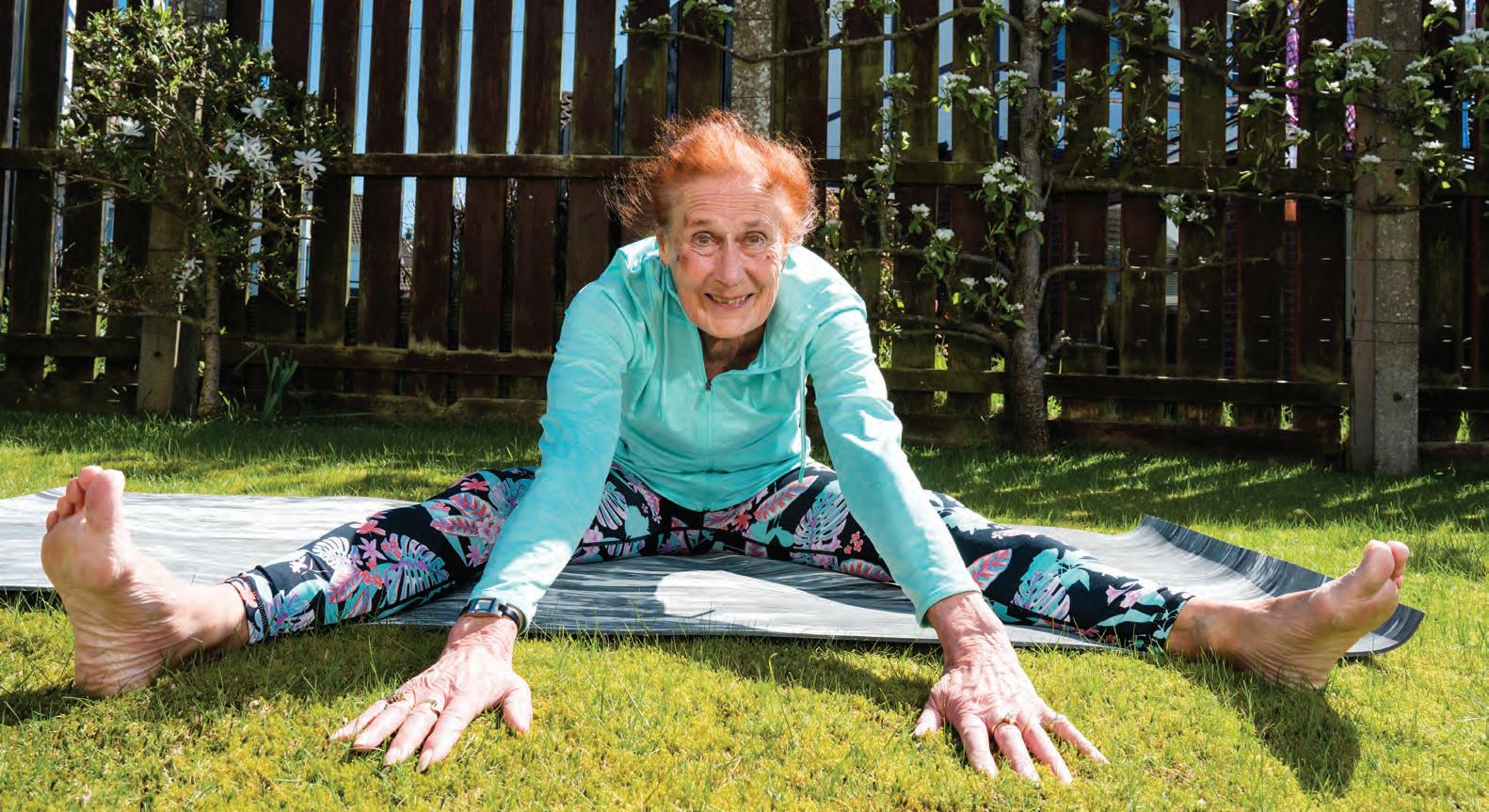
but took it up more regularly when I retired 15 years ago,” says Judi. “I wanted to stay active and have structure to my week so started doing classes in the village. During the pandemic, I discovered there were yoga classes on the App’s Wellbeing Hub, so I now do two online yoga classes a week as well. Kasia is a lovely teacher – she’s very good at communicating what you need to do.”
Judi, who was awarded the MBE for her voluntary work in the community, is enthusiastic about the health benefits of yoga. “I probably have more muscle now –it really tones you up. It keeps me supple and strengthens my bones.” She has also discovered the emotional benefits of her
practice, having been in the Christchurch earthquake in 2011. “I discovered that doing headstands under the supervision of a yogini is really good for getting rid of trauma – it just flowed out of my body.”
However, she cautions, “Don’t ever do anything you don’t feel comfortable with – the postures come with time and practice.”
An active volunteer in the Northern Ireland Benenden Health Community, Judi enjoys the convenience of taking the classes live or on demand to fit in with her schedule. She has encouraged her friends who are also members to join the classes too. “It’s a great benefit of membership. Why join if you’re not going to take advantage of the benefits?”
Scan the QR code below to download the App. Or go to the Apple App Store or Google Play.

To use the Benenden Health App, you must have registered for a My Benenden Account. You can use these credentials to log in to the App or, if you haven’t already done so, you can easily create an account via the App or online at my.benenden.co.uk


From combat classes to gentle meditation, see what works for you. Two of the trainers, Kasia and Laurel, tell us about the types of classes available and their associated health benefits
GREAT FOR: heart and lung health, stamina, stress reduction
Cardiovascular exercise is important to develop heart and lung health with the added boost of endorphins, the amazing hormones that relieve pain, reduce stress and improve mood.
Laurel Gosselin teaches a variety of classes for all age groups with cardio at the core. “Punch and kick out any negative energy in my Combat classes, lose yourself in the music during my Family Fit dance classes and push yourself to your limit with a short burst of intense work in my High Intensity Interval Training (HiiT) classes.
GREAT FOR: reducing risk of frailty and osteoporosis
Regular strengthening exercises become especially important as we age. Strength work helps to prevent conditions such as osteoporosis and being vulnerable to falls by encouraging the growth of muscle and bone.

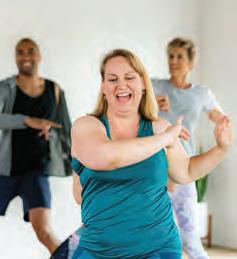

Laurel teaches upper body/lower body and full body strength classes where she explains techniques for proper movement patterns to build strength and prevent injury.
GREAT FOR: strength, flexibility and stress reduction

Practised for millennia, yoga strengthens muscles and improves flexibility, as well as being a powerful relaxation tool. But, our online yoga classes are not just for serious yoga bunnies!
Kasia Eliasz, who teaches yoga on the App, explains more about her approach. “My passion lies in creating an inclusive and welcoming space for all. Whether you’re a beginner or an experienced practitioner, my yoga flows cater to everyone, offering a chance to unwind, strengthen and focus on breath.”

GREAT FOR: flexibility and relaxation
Meditation is a great way to take some time out of your day for some serious self-care. One of Laurel’s classes combines breathing, movement and meditation. “It not only trains your body but also your mind. We start slowly with the breath and move into some dynamic movement to get the heart rate up and the body warm. We finish with some gentle stretching and a guided meditation to leave you feeling invigorated yet relaxed.”
GREAT FOR: muscle tone and increasing stamina
If you’re looking to build strength, muscle and stamina to a pumping soundtrack, try Ballet Barre.
“Combining Pilates with yoga and ballet-ish movements, Barre will have you burning in all the right places, and your core won’t know what hit it,” says Laurel. “The best part of it is, the music is so good, you won’t notice what a great workout you’re getting.”

Being active is as important as medication for those with Parkinson’s

Around 145,000 people in the UK have Parkinson’s –it’s the world’s fastest growing neurological condition. But living with Parkinson’s is different for everyone
BY JANE YETTRAMTalk to people with Parkinson’s and the first thing you’ll notice is how varied the symptoms are.
“The most recognised symptoms are a tremor (shaking), slowness of movement, and rigidity or muscle stiffness,” says Professor Richard Walker, a consultant geriatrician and co-Clinical Director of the Parkinson’s Excellence Network (part of Parkinson’s UK). “However, there are over 40 symptoms and everyone has a different experience of the condition’s progress,” he adds. “The way it affects an individual can change daily or even by the hour.”

Parkinson’s is caused when the brain cells that make dopamine – a chemical messenger – start to die. Overall, symptoms fall into two categories – motor and non-motor symptoms.
“Motor symptoms affect movement and balance,” explains Professor Walker. “Non-motor symptoms include memory and cognitive issues, pain, sleep problems and mental health issues.”
To make a diagnosis, a specialist will take a detailed medical history and look for common signs. During the consultation, you may be asked to:
∙ WRITE OR DRAW – to see if your writing is small or gradually fades.
∙ WALK – to look for a reduction in the natural swing of your arms or in your stride length and speed.
∙ SPEAK – to see if your voice is soft or lacks volume.
The specialist will also check your:
∙ FACE – for a ‘masked’ look or difficulty with facial expressions.
∙ LIMBS – for a tremor, stiffness or slowness of movement.
Your GP can refer you for Diagnostic services. Call us on 0800 414 8100 to see how we can support you.
There are four types of Parkinson’s medication, each addressing the lack of dopamine in a different way.
“Because everyone’s Parkinson’s is unique, different treatment combinations will suit different people,” says Professor Walker.
Sometimes the drugs themselves can cause side effects. The most common of these include:

∙ wearing off (when the effect of the medication lessens) and dyskinesia (involuntary movements such as twitches, jerks or writhing).
∙ hallucinations or delusions.
∙ impulsive and compulsive behaviour, such as gambling or binge eating.
“If you have side effects, talk to your specialist about adjusting the treatment regime,” Professor Walker advises.
Although there’s currently no cure, Parkinson’s UK is supporting 12 research projects, some focusing on new ways to slow or stop the condition’s progression, and others developing drugs to treat symptoms. “We believe we’ll deliver the next new treatment for people with Parkinson’s in years, not decades,” says Professor Walker.
Connecting with other people with Parkinson’s can make a difference – as the podcast series Movers & Shakers proves. In it six friends – including former BBC journalists Rory CellanJones and Mark Mardell, as well as broadcaster Jeremy Paxman – discuss the reality of life with Parkinson’s.

Rory explains: “The point of our podcast is to bring to light what we’d already been doing – meeting in the pub to share our
experiences and learn from each other, but also to have a bit of a laugh and a moan.”
The podcast has prompted huge support from people with Parkinson’s, and shown the value of bringing people together. “As one letter we received spelled out, the people who know about Parkinson’s are people with Parkinson’s,” says Rory. “So building a community and sharing our knowledge is incredibly important.”

To manage symptoms, try:
∙ BEINGACTIVE: “Physical activity – aim for 2.5 hours per week – can be as important as your medication,” explains Professor Walker.
∙ SINGING: As well as relieving symptoms by relaxing muscles and releasing tension, singing reduces anxiety and depression by lowering stress hormones and increasing endorphins, the brain’s feel-good chemical.
∙ DANCING: Whether seated dance, ballet or tap, dance can give you confidence to move more freely.
∙ MUSIC: Used by therapists to improve walking and balance, studies also show that music helps with cognition and movement.
∙ BenendenHealth’sCarePlanning andSocialAdviceservicecanhelp withallaspectsofadultcare.Formore information,call08004148100.
∙ Forinformationandtips,pluslinks tolocalsupportgroups,visit parkinsons.org.uk.

∙ TotalktoaspecialistParkinson’s nurseonafree,confidentialhelpline, call08088000303.
“There’s a lot of fun and silliness – and some very strange exercises, such as poking tongues out at each other and roaring like a lion.”
Former opera singerJane Metcalfe is describingThe ParkinSongsters, a weekly singing group she runs in East Sussex for people with Parkinson’s. “Speech problems are common and initiallythe group focused on breathing exercises, and physical exercises to do with the mouth, the tongue and facial expression,” saysJane. “But, of course, singing is the best wayof putting all of those exercises together, helping to promote diction and strengthen the voice.”
What’smorethesessions arefun.“Manyexercisesare likeplayingbecause,as adults,weforgethowto play,”saysJane.“Oneis called‘marketcries’.Each persondecideswhatthey wanttosellinamarketplace andtheyhavetotrytoshout eachotherdown–yelling ‘Nicebananas!’forexample!”
Thiselementoffunis crucial,because–aswiththe actofsingingitself–it releasesfeel-goodendorphins andevendopamine.“That’s whyIencouragelaughterand interaction,suchasmen singingoneverseandwomen singingthenextinresponse.”
Of one participant with advanced Parkinson’sJane says: “I am staggered at the improvement in his speech and facial expressions. He smiles, activelyshowing his

pleasure.” Another has told her how it has helped lift him out of his tendencyto depression. “That’s the communal thing – it brings a kind of quiet joy.”
Everythreemonths,the groupputsonaperformance. “Thisbringsnewchallenges andsomethingtowork towards.Igivepeoplelittle solosorputthemintosmall groups,sotheyhavetotry harder.It’sextraordinaryto seethem.Theyalwaysdoa
goodjob–andwehaveabig followingsoit’sreallyexciting!
“We sing popular songs from the participants’youth. First it was 50s numbers, now we’re onThe Beatles, Simon and Garfunkel and even Abba. We mix those with songs from the shows, traditional songs, some classical and harmony.”
Performingtoanaudience alsohasitsbenefits.“It’s aboutexpressingyourself, abouttheenergybetween performersandaudience, aboutcommunication.”
∙ parkinsongsters.co.uk
‘Manyexercisesarelikeplaying–asadults,weforgethowtoplay’
“Singing is the best way of putting all of those exercises together,” says Jane Metcalfe
View the results of the 2023 Direct Member Voting process announced at Conference 2023 by scanning this QR code:

Our new Online Community and Member Meetups offer a great chance to find out more about your membership, look after your health and have your say
As Benenden Health members, you are at the heart of everything we do. Which is why we’re excited to introduce two new ways in which you can engage with us. It’s your ideas that help to shape the organisation. So why not get involved?
Your new Online Community The Benenden Health Online
Community is a friendly space that members have access to once they register for an account (see ‘Join your Online Community today’, opposite, for how to do this).
It’s a great way to keep up to date with membership news and announcements, and to share your ideas, in a way that fits around your busy life.
The Online Community is a safe and welcoming space for our members, which is easy to use and simple to navigate.
1. Find out more about how you can look after your own health and wellbeing
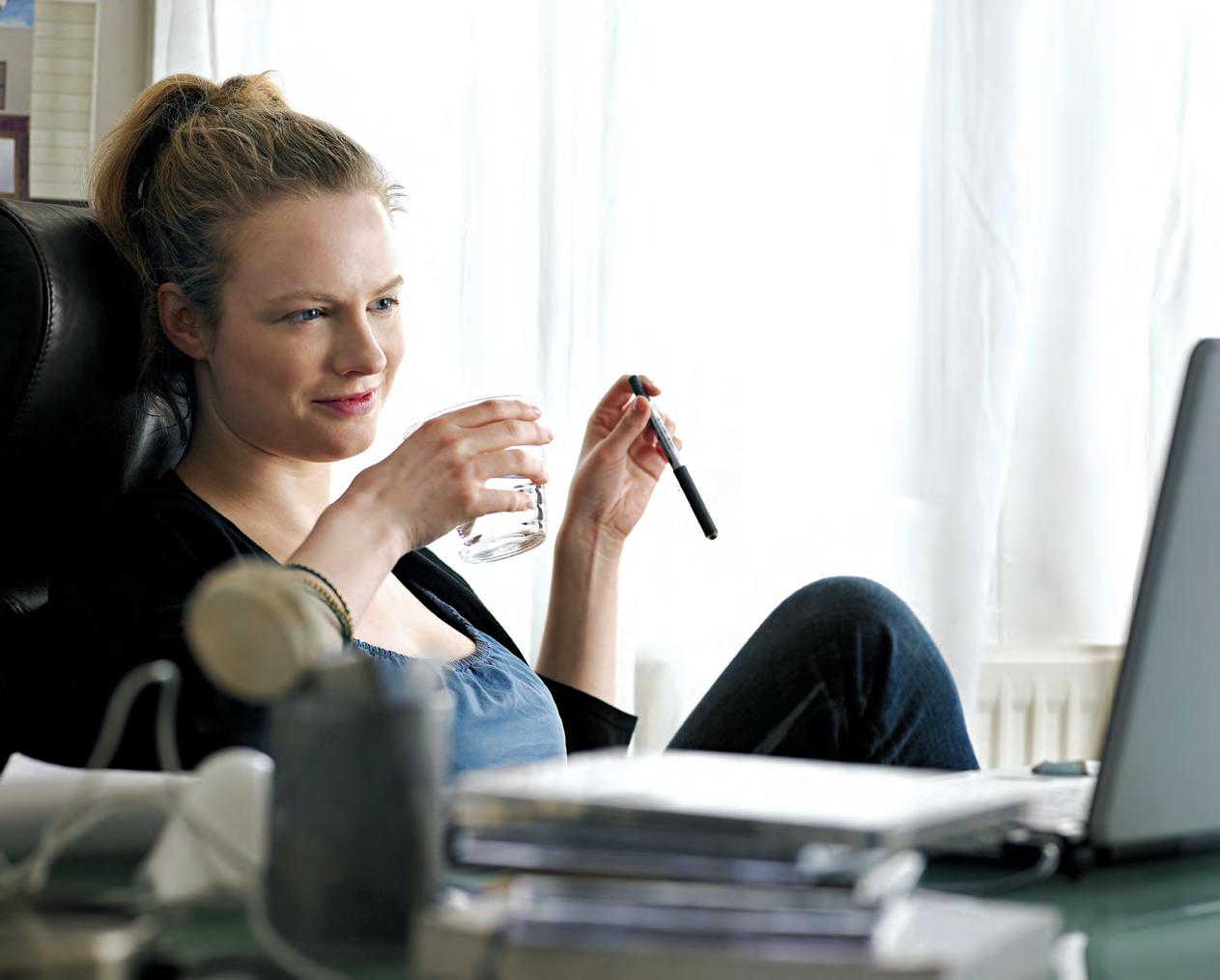
Our purpose at Benenden Health is to work together to improve the nation’s health, and we put that at the forefront of everything we do. So, we’ll share information about how you can look after your own health and encourage you to
share your own tips with your fellow members.
2. Submit ideas
It’s not just health and wellbeing conversations you can get involved in. If you think there’s a product or service that would make your Benenden Health membership even more valuable, you can tell us. By proposing your idea online, you will be able to find out what other members think and work with your Community
If interacting online isn’t for you, we have lots of in-person events throughout the UK where you can drop in at a time that suits you. Like the Online Community, Member Meetups are focused on health and wellbeing, considering member ideas, and sharing information about our products and services – with the bonus of meeting your volunteer Community Representatives and fellow members in person.
You’re welcome to attend any Member Meetup that suits you and stay for as long as you like. You might want to pop in for 10 minutes to speak to your Community Representatives, or stay longer, have a cup of tea and hear from a guest speaker.
In July we contacted members to invite them to
Representatives to formally submit your idea for consideration.
3. Interact with other members and your Community Representatives
Within the Online Community you will have access to your own Local Community board. Here, we offer a safe space for you to interact with Benenden Health and your fellow members.
Whether you’ve been with us for a few months or 20 years, you make the membership what it is. So browse to see if there’s anyone who shares your interests.
attend our meetups. Since then we have been meeting with members around the country who have come along to find out more about their Benenden Health membership and have their say.
Whether you choose to engage with us online via our
4. Find out more about Member Meetups and book your place Member Meetups are a way to engage with your volunteer Community Representatives face-to-face and hear from healthcare guest speakers. You can find out more about our Member Meetups and book your place on the Online Community.

5. Stay informed
We’ll also use the Online Community to post updates on a whole range of topics. It might be we’ve made changes to our services or a new product has launched. This is where you can find out first when the Member Meetups are happening.
Benenden Health Online Community, or by attending a Member Meetup, we look forward to hearing your views.
∙ Scan the QR code to log in. Once logged in, you’ll find an information box titled Member Meetups

You’ll need a My Benenden account to access the Online Community and to register for Member Meetups.
If you’ve already got a My Benenden account –great! You just need to visit benenden.co.uk/login
1. Enter your My Benenden email and password to log into the website. Once in, click the Community tab in the top right of the page.
Pop in for a chat and a cuppa
2. Add a username and accept the Terms and Conditions and you’re good to go.
Don’t worry if you don’t have a My Benenden account, all you need is an email address and your membership number. Just visit benenden.co.uk/login, select Create Account located at the bottom of the page and follow the onscreen instructions.
With summer in full swing, now's the time to really enjoy the outdoors and the warm weather with family and friends.
With that in mind, we've got some handy lips on how to get your daily steps in and get more vitamin D Into your body.
Many of us will be enjoyir19food with friends, so check out some delicious recipes on the BenendenHealth App for the taste of summer.

Plus, did you know, gardening Is good for your health? All the more reason to get outdoors and get your garden ready for BBQ season.
Let's get ready for summer together!

●You can call our helpline or log in to the Benenden Health App* 24 hours a day, seven days a week to book an appointment for a telephone orvideo consultation with a GP 08004148247
AFTER6MONTHS
● Ifyou’restruggling, callourhelpline, available24/7,tobook anappointmentfor supportandadvice
08004148247
● Find out more about accessing advice on all aspects of care including special needs support 08004148100
YoucancallourfriendlyMemberServicesteamon08004148100todiscuss DiagnosticsandTreatment.Wejustneedtoaskyouafewquestions…
● Who haveyou been referred to? (Consultant ortest type)
● HowlongistheNHSwait?
● Do you haveyour referral letter? (from a qualified NHS practitioner)
Youcanalsoaccessthefollowingservices: Physiotherapy



● What is the CCSD code?**

● Howlongis the NHS wait?
● Doyou haveyour consultant’s report?
**CCSD code – this isyour treatment procedure code
●You can speak to a chartered physiotherapist followingyour call to Benenden Health
08004148100
● Short-term structured support such as counselling or supported self-help to helpyou manage or overcome a mental health issue
08004148247
● Ifyou have cancer, our Cancer Support service offers access to an experienced registered nurse who will provideyou with emotional and practical support and advice.This service was previouslyknown as Financial Assistance.
08004148100
With effect from 1stJanuary2024,your Benenden Health membership willno longerprovideaccess totreatmentservices forvaricosevein procedures.
As our services are provided on a discretionarybasis and are subject to the resources we have available, we mayfrom time-to-time change the list of approved procedures.This is because we want to help as manymembers as possible while offering an attractive and affordable product. There are manyother services offered as part ofyour membership, and we have therefore taken the difficult decision to remove varicose veins treatment from our list of procedures.
● Benenden CharitableTrust 08004148450
● Add familyand friends toyour membership 08004148470
*Appointments via the App are available 8am until 10pm. For appointments outside these hours, please call instead.
applied
the base price only and available to all Benenden Health members who quote MEMBERS when taking out a travel insurance policy. Offer is available to new policies only. Benenden Travel Insurance reserves the right to alter, amend or withdraw this offer at any time.

A From 105,000+ Trustpilot reviews correct as of July 2023.
Benenden Travel Insurance is offered by Benenden Wellbeing Limited, an insurance intermediary, which is authorised and regulated by the Financial Conduct Authority (Financial Services Register number 593286). Registered in England and Wales (Company no. 8271017). Benenden Wellbeing Limited is a wholly owned subsidiary of The Benenden Healthcare Society Limited. The Registered Office of both is: Holgate Park Drive, York, YO26 4GG. Benenden Health is a trading name of The Benenden Healthcare Society Limited.
Benenden Travel Insurance is arranged by AIIClear Limited, which is registered in Gibraltar company number 117274. Registered Office: 1st Floor, Portland House, Glacis Road, Gibraltar, GX111AA. AIIClear Limited is licensed and regulated by the Gibraltar Financial Services Commission number FSC25393 and trades into the UK on a freedom of services basis, FCA FRN 824283. Benenden Travel Insurance is administered by AIIClear Insurance Services Limited, registered in England No. 04255112. Registered Office: AIIClear House, 1 Redwing Court, Ashton Road, Romford, RM3 SQQ. Authorised and Regulated by the Financial Conduct Authority firm reference number 311244.
The insurance is underwritten by Zurich Insurance pie, authorised and regulated by the Central Bank of Ireland. Authorised by the Prudential Regulation Authority and with deemed variation of permission. Subject to regulation by the Financial Conduct Authority and limited regulation by the Prudential Regulation Authority. Details of the Temporary Permissions Regime, which allows EEA-based firms to operate in the UK for a limited period while seeking full authorisation are available on the Financial Conduct Authority's website. FCA firm reference number 203093.
Published
BenendenHealth
HolgateParkDrive, YorkYO264GG Telephone08004148100* benenden.co.uk
Editor SarahNotton behealthy@benenden.co.uk
Contributingeditors
DawnHarper, MatthewRock
Groupartdirector
MatthewBall
Designer
JohnPender
Groupmanagingeditor
SianCampbell
Managingeditors
KirstyFortune, AndrewLittlefield
Advertisingsales
JamieDawson jamie.dawson@thinkpublishing. co.uk 02037717208
Executivedirector
JohnInnes john.innes@thinkpublishing. co.uk
ProducedforBenenden HealthbyThink
20MortimerStreet, LondonW1T3JW Telephone02037717200 thinkpublishing.co.uk
©BenendenHealthcare Society.Reproductionin wholeorpartwithout writtenpermissionisstrictly prohibited.Theviews expressedinthismagazine arenotnecessarilythose ofBenendenHealth.All advertisingisacceptedingood faithandnoendorsement shouldbeinferred;neither shouldthepresenceofany BenendenHealthbusiness’s logoinapromotion(aspart ofacommercialarrangement withaselectedpartner)be construedasanendorsement. Pleasecheckanymedical ordietaryadvicewithyour owndoctor.
Circulation
357,302ABC(Jan-Dec2019)
*Pleasenote,callsmaybe recordedforourmutual securityandalsofortraining andqualitypurposes.

Hasyour Benenden Health membership givenyou access to diagnostics/ treatment/support that otherwise you would’ve had a long wait for?
We’d love to hearfromyou so we can shareyour experience with members and non-members. Email us at behealthy@benenden.co.uk
62 about the importance of responding promptly to symptoms which indicate that there may be a problem with the prostate. My husband is currently being treated for an aggressive prostate cancer, which fortunately was detected early. The treatment he has received throughout has been excellent. We are so thankful to his GP for putting him on the right pathway without delay.
Shareyour experienceonlineat uk.trustpilot.com/ review/benenden. co.ukorscanthe QRcodeabove

The resounding message in the article was not to ignore symptoms, but to get them checked out. My husband wholeheartedly believes that this is very sound advice. Anyone with symptoms should contact their GP without delay.
Christine Cardy
Having experienced chronic sleep difficulties for some years, I was keen to read the Pillow Talk article (issue 62) about sleep hygiene. Yes, it included some content I’ve seen before about reducing alcohol and caffeine and not using devices at night. However, the insomnia self-help guide gave me a new perspective on what may be causing my sleep issues and how these could be addressed.
Pleased to say I’m trying some of these out in conjunction with the resources on the Benenden Health App. Fingers crossed some better nights will feature soon.
Keep it up.
Ann Hughesof Be Healthy magazine regarding urinary incontinence. It filled in the gaps in my understanding of what my wife was going through in the latter years of her life.
May I request that you do a related article in the magazine covering the other side of this coin – those of us who are slave to the catheter as we have become unable to urinate naturally.
Medical staff did explain to me what is happening, but the meaning gets lost when over-technical language is used.
Your incontinence article did not fall into that trap and was, hence, easy to understand.
Brian MurrayCONNECT WITH BENENDEN HEALTH on Facebook and Instagram
Thanks forthe suggestion Brian. We will consider covering this topic in a future issue.
Theseletterswere receivedinresponseto thespring2023issue. Sometimeslettersor emailshavetobeedited tofitonthepage.
Togetintouchaboutthis issueofBeHealthy,please emailbehealthy@ benenden.co.ukorwriteto usatBeHealthy,Benenden Health,HolgatePark Drive,YorkYO264GG.
Ourstarletterischosen bythemagazine’s editorialteam.Nocash alternativesareavailable.
Thewriterofthestar letterwillreceive a£25M&Svoucher.
Getting an appointment with a GP is not always easy. Many people run the gauntlet of 8am phone calls to their surgery, waiting on hold for what seems like a lifetime, only to be told that the appointments have already been allocated for that day and to call again tomorrow.
However, a pharmacist can help treat many everyday problems, advising on over-thecounter remedies and some formerly prescription-only treatments. Sometimes this requires them to do a brief consultation or for you to fill out a questionnaire, but it’s much quicker and more convenient than a doctor’s appointment or a trip to A&E. In fact, recent research by the NHS has shown that pharmacists could have treated about 10% of patients seen in casualty. From pain, migraines, indigestion, hay fever, obesity, hair loss, nausea and impotence, pharmacists are plugging the gaps.
There are now proposals for pharmacists to be able to prescribe medication for seven other conditions: earache, a sore throat, sinusitis, impetigo, shingles, infected insect bites and uncomplicated urinary tract infections in women, without the need for the patient to see a doctor or nurse. They will also be able to provide the oral contraceptive pill.
It’s been hailed by some as a ‘game-changer’ that will free up 15 million GP appointments over the next two years. While there’s no doubt that pharmacists are experts in pharmacology – they often know as much if not more about medications than doctors – I’m wary of these proposals. Not all pharmacists will be able to provide the service, so patients may spend time trying to find someone who is able to help them, and end up having to see a GP anyway.

Concerns have also been raised about confidentiality as many pharmacies don’t have private space for patients to discuss their symptoms. What’s more, while doctors undergo extensive training for many years to accurately diagnose conditions, pharmacists do not, yet this is what we are expecting them to do. It takes years of studying, training and experience to differentiate between something straightforward and something more sinister that requires further investigation. I worry that important signs and symptoms will be missed and patients will suffer as a result.
It also fails to address the actual problem – we don’t have enough GPs. This plan will do nothing to tackle the training and retention issues that beset primary care. Cherry-picking a few conditions and giving them to pharmacists along with a prescription pad doesn’t address why GPs feel so stressed, undervalued and pressured. I’d have thought the answer to the crisis would have been to focus on training more GPs and finding ways to keep and support the ones we already have.

Askingpharmacists toprescribefor commonconditions maynotbethe panaceapatients need,argues
MaxPemberton
ILLUSTRATION:PHILHACKETT
‘Iworrythat symptomswill bemissedand patientswill sufferasaresult’

